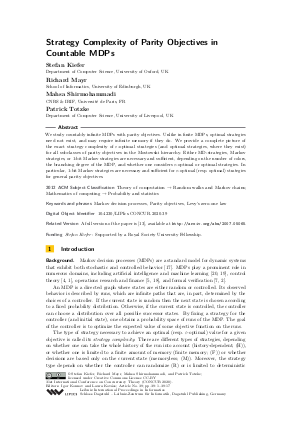Strategy Complexity of Parity Objectives in Countable MDPs
Authors Stefan Kiefer, Richard Mayr, Mahsa Shirmohammadi, Patrick Totzke
-
Part of:
Volume:
31st International Conference on Concurrency Theory (CONCUR 2020)
Part of: Series: Leibniz International Proceedings in Informatics (LIPIcs)
Part of: Conference: International Conference on Concurrency Theory (CONCUR) - License:
 Creative Commons Attribution 3.0 Unported license
Creative Commons Attribution 3.0 Unported license
- Publication Date: 2020-08-26
File

PDF
LIPIcs.CONCUR.2020.39.pdf
- Filesize: 0.68 MB
- 17 pages
Document Identifiers
Related Versions
-
A full version of the paper is [S. Kiefer et al., 2020], available at http://arxiv.org/abs/2007.05065.
Subject Classification
ACM Subject Classification
- Theory of computation → Random walks and Markov chains
- Mathematics of computing → Probability and statistics
Keywords
- Markov decision processes
- Parity objectives
- Levy’s zero-one law
Metrics
- Access Statistics
-
Total Accesses (updated on a weekly basis)
0Document
0Metadata
Abstract
We study countably infinite MDPs with parity objectives. Unlike in finite MDPs, optimal strategies need not exist, and may require infinite memory if they do. We provide a complete picture of the exact strategy complexity of ε-optimal strategies (and optimal strategies, where they exist) for all subclasses of parity objectives in the Mostowski hierarchy. Either MD-strategies, Markov strategies, or 1-bit Markov strategies are necessary and sufficient, depending on the number of colors, the branching degree of the MDP, and whether one considers ε-optimal or optimal strategies. In particular, 1-bit Markov strategies are necessary and sufficient for ε-optimal (resp. optimal) strategies for general parity objectives.
Cite As Get BibTex
Stefan Kiefer, Richard Mayr, Mahsa Shirmohammadi, and Patrick Totzke. Strategy Complexity of Parity Objectives in Countable MDPs. In 31st International Conference on Concurrency Theory (CONCUR 2020). Leibniz International Proceedings in Informatics (LIPIcs), Volume 171, pp. 39:1-39:17, Schloss Dagstuhl – Leibniz-Zentrum für Informatik (2020)
https://doi.org/10.4230/LIPIcs.CONCUR.2020.39
BibTex
@InProceedings{kiefer_et_al:LIPIcs.CONCUR.2020.39,
author = {Kiefer, Stefan and Mayr, Richard and Shirmohammadi, Mahsa and Totzke, Patrick},
title = {{Strategy Complexity of Parity Objectives in Countable MDPs}},
booktitle = {31st International Conference on Concurrency Theory (CONCUR 2020)},
pages = {39:1--39:17},
series = {Leibniz International Proceedings in Informatics (LIPIcs)},
ISBN = {978-3-95977-160-3},
ISSN = {1868-8969},
year = {2020},
volume = {171},
editor = {Konnov, Igor and Kov\'{a}cs, Laura},
publisher = {Schloss Dagstuhl -- Leibniz-Zentrum f{\"u}r Informatik},
address = {Dagstuhl, Germany},
URL = {https://drops.dagstuhl.de/entities/document/10.4230/LIPIcs.CONCUR.2020.39},
URN = {urn:nbn:de:0030-drops-128513},
doi = {10.4230/LIPIcs.CONCUR.2020.39},
annote = {Keywords: Markov decision processes, Parity objectives, Levy’s zero-one law}
}
Author Details
Funding
- Kiefer, Stefan: Supported by a Royal Society University Fellowship.
References
- P. Abbeel and A. Y. Ng. Learning first-order Markov models for control. In Advances in Neural Information Processing Systems 17. MIT Press, 2004. URL: http://papers.nips.cc/paper/2569-learning-first-order-markov-models-for-control.
-
C. Baier and J.-P. Katoen. Principles of Model Checking. MIT Press, 2008.

-
P. Billingsley. Probability and Measure. Wiley, 1995. Third Edition.

-
V. D. Blondel and J. N. Tsitsiklis. A survey of computational complexity results in systems and control. Automatica, 2000.

-
N. Bäuerle and U. Rieder. Markov Decision Processes with Applications to Finance. Springer-Verlag Berlin Heidelberg, 2011.

- K. Chatterjee, M. Jurdziński, and T. Henzinger. Quantitative stochastic parity games. In Annual ACM-SIAM Symposium on Discrete Algorithms. Society for Industrial and Applied Mathematics, 2004. URL: http://dl.acm.org/citation.cfm?id=982792.982808.
- E. M. Clarke, T. A. Henzinger, H. Veith, and R. Bloem, editors. Handbook of Model Checking. Springer, 2018. URL: http://dx.doi.org/10.1007/978-3-319-10575-8.
-
E.M. Clarke, O. Grumberg, and D. Peled. Model Checking. MIT Press, December 1999.

-
E. Grädel, W. Thomas, and T. Wilke, editors. Automata, Logics, and Infinite Games, LNCS, 2002.

- T. P. Hill. On the existence of good Markov strategies. Transactions of the American Mathematical Society, 1979. URL: http://dx.doi.org/10.1090/S0002-9947-1979-0517690-9.
-
T. P. Hill. Goal problems in gambling theory. Revista de Matemática: Teoría y Aplicaciones, 1999.

- S. Kiefer, R. Mayr, M. Shirmohammadi, and P. Totzke. Büchi objectives in countable MDPs. In International Colloquium on Automata, Languages and Programming. LIPIcs, 2019. A technical report is available at https://arxiv.org/abs/1904.11573. URL: http://dx.doi.org/10.4230/LIPIcs.ICALP.2019.119.
- S. Kiefer, R. Mayr, M. Shirmohammadi, and P. Totzke. Strategy Complexity of Parity Objectives in Countable MDPs. CoRR, 2020. URL: http://arxiv.org/abs/2007.05065.
-
S. Kiefer, R. Mayr, M. Shirmohammadi, and D. Wojtczak. Parity objectives in countable MDPs. In Annual IEEE Symposium on Logic in Computer Science, 2017.

-
A. Mostowski. Regular expressions for infinite trees and a standard form of automata. In Computation Theory, LNCS, 1984.

-
D. Ornstein. On the existence of stationary optimal strategies. Proceedings of the American Mathematical Society, 1969.

-
M. L. Puterman. Markov Decision Processes: Discrete Stochastic Dynamic Programming. John Wiley & Sons, Inc., 1st edition, 1994.

-
M. Schäl. Markov decision processes in finance and dynamic options. In Handbook of Markov Decision Processes. Springer, 2002.

-
O. Sigaud and O. Buffet. Markov Decision Processes in Artificial Intelligence. John Wiley & Sons, 2013.

-
R.S. Sutton and A.G Barto. Reinforcement Learning: An Introduction. Adaptive Computation and Machine Learning. MIT Press, 2018.

-
M.Y. Vardi. Automatic verification of probabilistic concurrent finite-state programs. In Proc. of FOCS'85, 1985.

-
W. Zielonka. Infinite games on finitely coloured graphs with applications to automata on infinite trees. Theoretical Computer Science, 1998.

-
W. Zielonka. Perfect-information stochastic parity games. In Foundations of Software Science and Computation Structures, LNCS. Springer, 2004.

